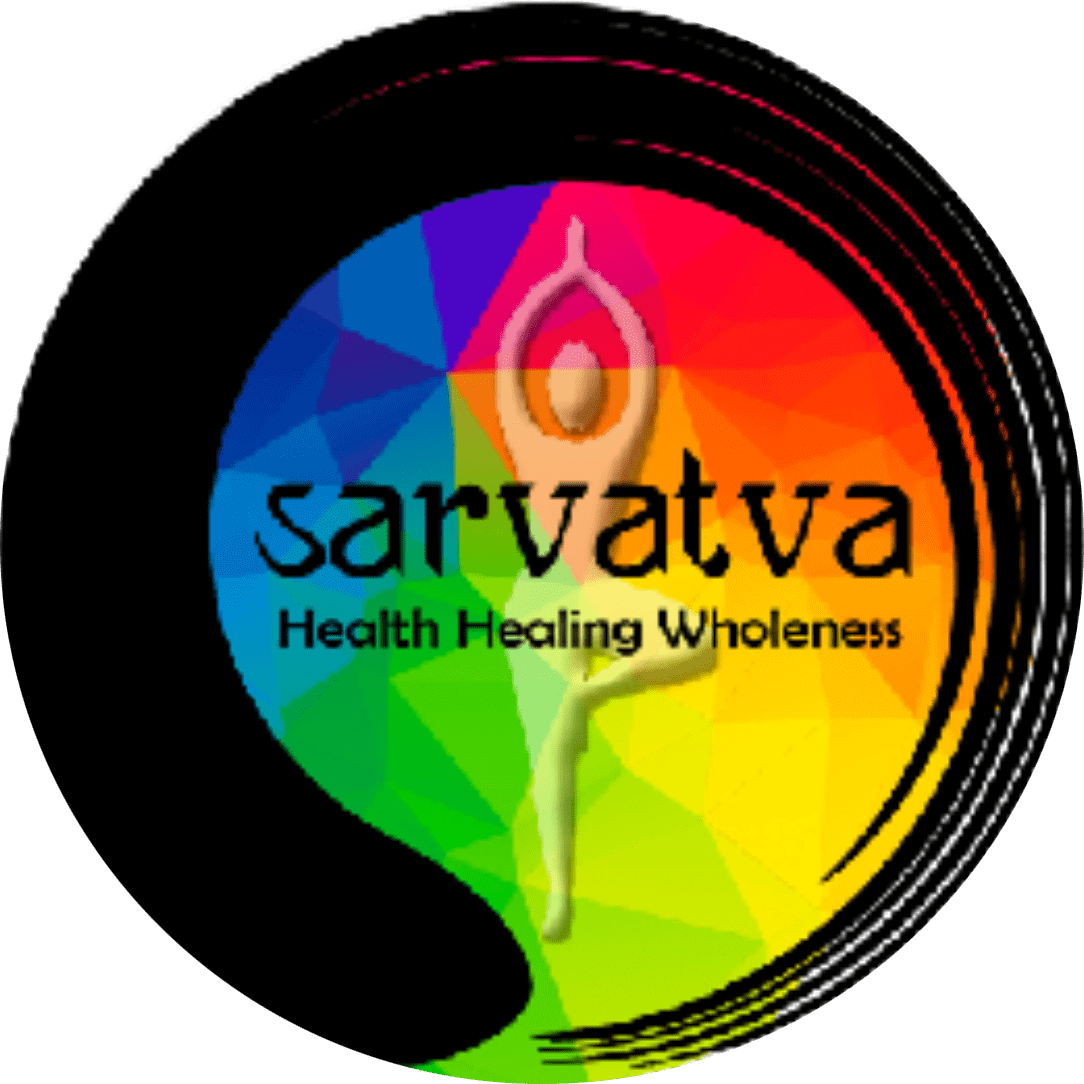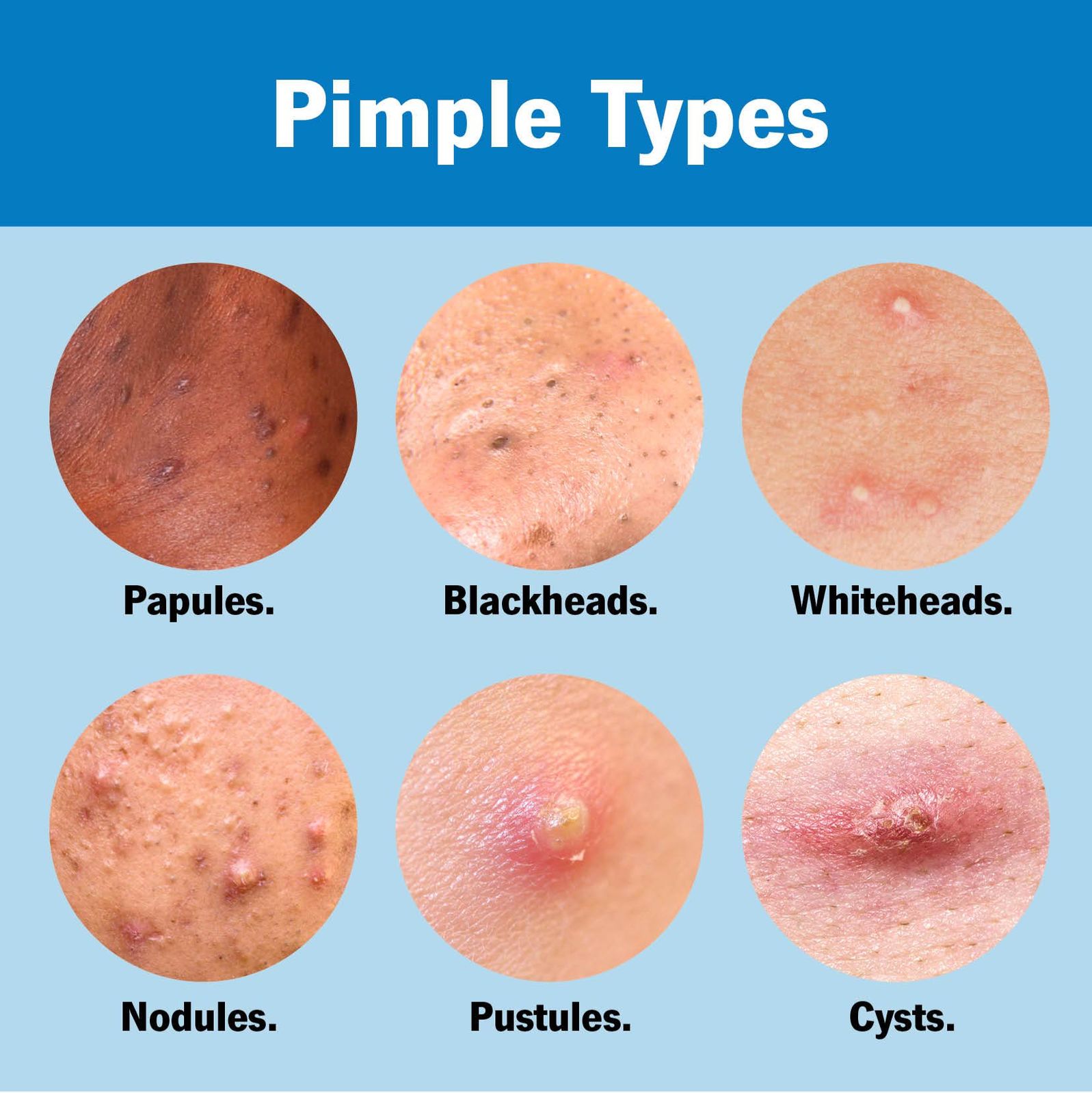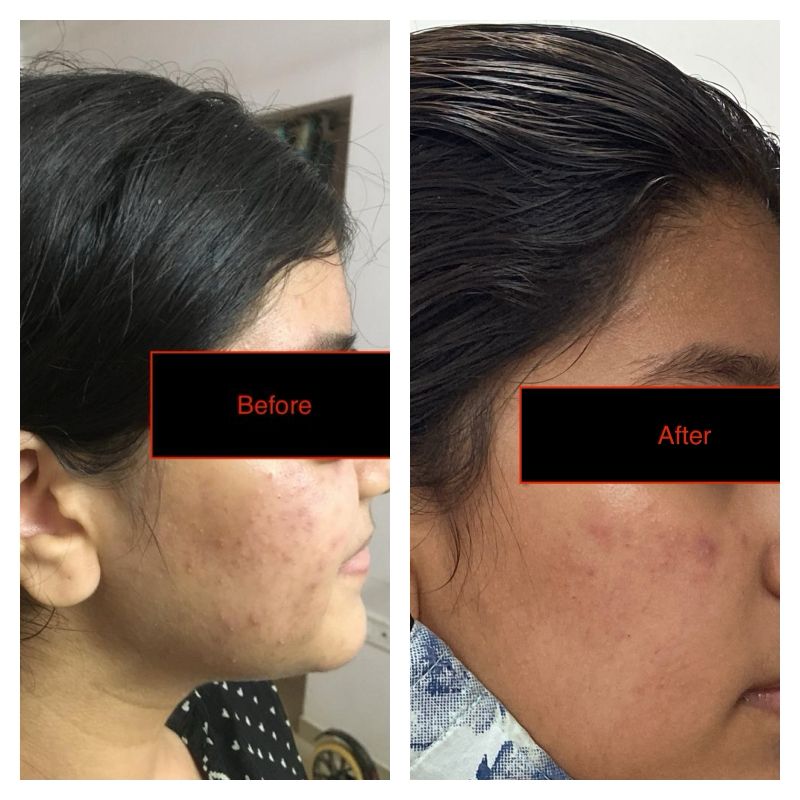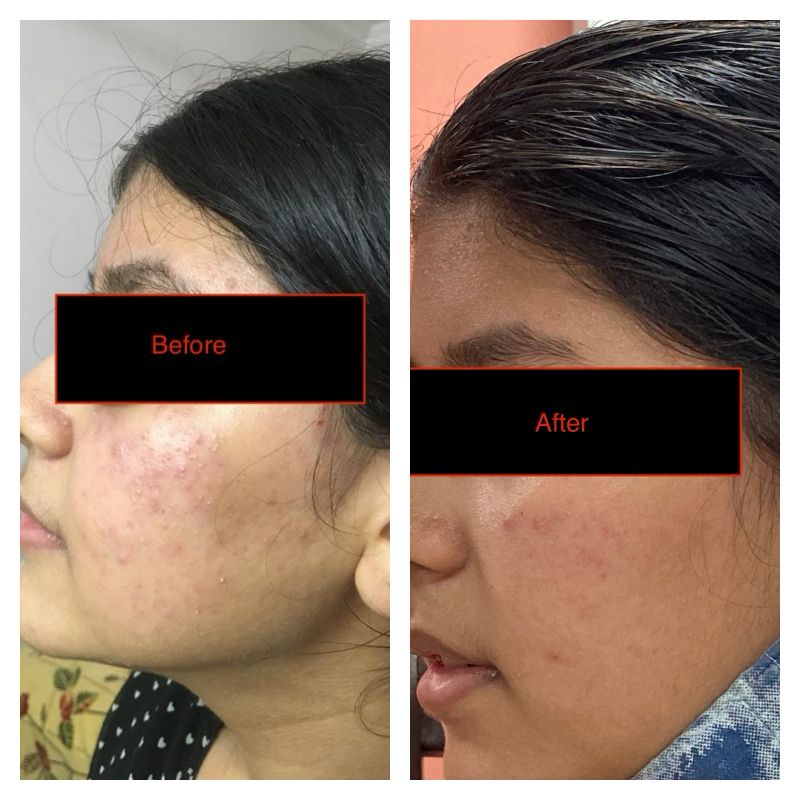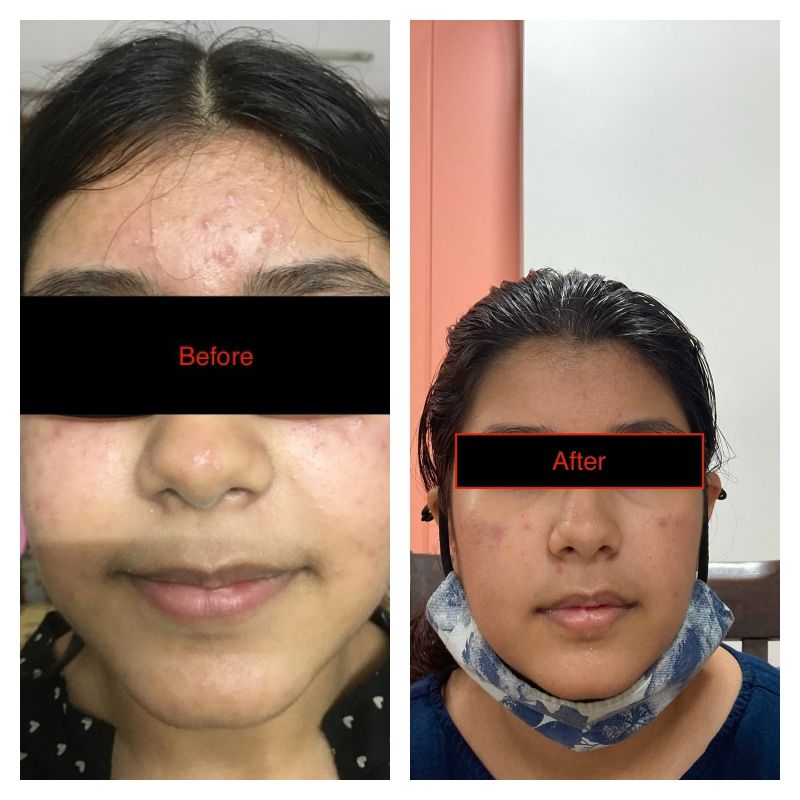What is Acne?
Your skin has tiny holes called pores that can become blocked by oil, bacteria, dead skin cells, and dirt. When this occurs, you may develop a pimple, sometimes also called a zit or blemish.
Acne is very common. In fact, research estimates that 9.4 percent of people worldwide have acne. While acne doesn’t pose a serious risk to your overall health, it can still be painful, particularly if you have severe acne. Over time, acne might also cause scarring.
Acne also contributes to emotional distress. Acne and acne scars on your face and other visible body locations can affect self-esteem and self-confidence, and they can even contribute to feelings of anxiety or depression.
What causes acne?
Acne occurs when the pores of your skin become blocked with oil, dead skin, or bacteria.
Each pore of your skin opens to a follicle. The follicle is made up of a hair and a sebaceous (oil) gland.
The oil gland releases sebum (oil), which travels up the hair, out of the pore, and onto your skin. Sebum helps keeps your skin lubricated and soft.
One or more mishaps in this lubrication process can contribute to acne.
Acne might occur, for example, when:
- your follicles produce too much oil
- dead skin cells accumulate in your pores
- bacteria build up in your pores
Any of these concerns can lead to pimples, which develop when bacteria grow in a clogged pore and the oil can’t escape.
What are the different types of acne?
If you have acne, you might notice a mix of pimple types.
Whiteheads and blackheads, both also referred to as comedones, are the most common acne lesions.
- Blackheads, or open comedones, open at the surface of your skin. Oxygen in the air (not dirt) gives the top of these pimples their darker appearance.
- Whiteheads, or closed comedones, form as raised bumps under the surface of your skin. They remain flesh-colored.
Inflammatory lesions, which are more likely to cause scarring of your skin, include:
- Papules. These small, red, raised bumps are caused by inflamed or infected hair follicles.
- Pustules. These small red pimples have pus at their tips.
- Nodules. These solid, often painful lumps develop beneath the surface of your skin.
- Cysts. These large lumps beneath your skin contain pus and are usually painful.
What are the symptoms of acne?
Acne can be found almost anywhere on your body, but you’ll most commonly notice breakouts on your:
- face and neck
- back
- shoulders
- chest
Pimples can give your skin a rough, uneven texture.
With acne, you might also experience:
- skin discoloration, including dark patches or spots (hyperpigmentation) and redness
- swelling and inflammation
- pain and tenderness when touched or not
Acne breakouts can also cause scarring or discoloration on your skin.
What are the risk factors for developing acne?
Experts still don’t know exactly why some people experience acne and others don’t.
That said, they do recognize a number of risk factors can contribute to or worsen acne, including:
- hormonal changes due to pregnancy or puberty
- polycystic ovarian syndrome (PCOS) and other endocrine conditions
- cigarette smoking
- poor sleep
- stress
- cleansers, creams, moisturizers, and other beauty products with high oil content
- certain medications, including lithium, some types of hormonal birth control, anticonvulsants, and steroids
- a family history of acne
You have the highest risk of developing acne during puberty. During this time, your body undergoes many hormonal changes. These changes can trigger oil production, leading to an increased risk of acne. Hormonal acne related to puberty usually improves when you reach adulthood, and your breakouts may even stop completely.
Certain foods or diets may also have an effect on acne:
- Low glycemic index diet. Cutting back on foods with a high glycemic index, such as refined carbs and added sugars, could help reduce acne lesions.
- Milk products. Consuming certain milk products, like milk and ice cream, seems to worsen acne for some people. However, cheese, as well as nonmilk dairy products, don’t seem to worsen acne.
- Fat and fatty acids. Omega-3 and omega-6 fatty acids may help reduce acne breakouts.
- Vegan and vegetarian diets. While vegan and vegetarian diets can offer plenty of health benefits, little evidence supports them specifically for the treatment of acne.
- Probiotics. While probiotics — found in yogurt, other fermented foods, and supplements — could help improve acne, experts have yet to find conclusive support for probiotics as an acne treatment.
Conventional treatment for acne generally consists of –
- Over-the-counter (OTC) cleansers and spot treatments
- Local application of – Benzoyl peroxide, Salicylic acid; antibiotics, like erythromycin or clindamycin and Retinoids, such as retinol.
- Some cases may be prescribed – oral antibiotics, hormonal birth control or oral isotretinoin, vitamin-A medication used to treat certain cases of severe nodular acne
However, excessive and prolonged use of antibiotics can build up a resistance and leave you prone to infections.
Vit A medication can cause serious side effects, and is not recommended before, during and post pregnancy.
Some medical procedures may be advised which work by removing damaged skin and
reducing oil production. They include:
- Dermabrasion
- Chemical peel and
- Cortisone injections.
However these medicines and procedures do not prevent acne and provide temporary relief.
Role of Homeopathy –
- Improving systemic hormone balance
- Balancing oil production
- Preventing acne
- Treating the existing pimples and prventing scars.
- Improving the skin texture
- Treating the pre-existing conditions which can cause acne – PCOD, menopause etc with holistic improvement.
Additionally, you can try these at-home tips to help clear up acne and help prevent future breakouts:
- Apply tea tree oil.
- Apply aloe vera.
- Use a honey mask.
- Refresh your face with green tea.
- Avoid touching your face.
- Never squeeze or pick pimples. It makes scarring more likely, and it can also spread bacteria and excess oil.
Preventing acne
You can take certain steps at home to help lower your chances of getting pimples or acne breakouts.
Try these tips:
- Wash your face daily with an oil-free cleanser.
- Try an OTC acne cleanser to help remove excess oil.
- Use water-based makeup or products labeled “noncomedogenic” — this means they’re less likely to clog your pores.
- Avoid skin care and makeup products that contain oil.
- Always remove makeup and cleanse your skin thoroughly before bed.
- Shower or wash your face after exercising.
- Tie back long hair to keep it out of your face.
- Avoid tight-fitting hats, headbands, and clothing that covers breakout-prone areas.
- Eat a balanced diet, and stay hydrated.
- Take steps to reduce stress.
What’s the outlook for someone with acne?
It goes without saying that no one should judge or stigmatize you for having acne, but having acne can feel distressing and isolating, all the same.
No matter how uncomfortable it is to have this skin condition, it could help to remember that you’re not alone. Pretty much everyone will get a pimple at some point in life, and many people deal with different forms of acne well into adulthood.
Choosing the right treatment approach will clear up your acne and set you moving on the path of holistic health!
Sharing some pictures of a young girl young girl suffering from acne and allergic cough. Apart from rapid reduction inthe breakouts, her allergic cough was completely better within six months of treatment, signalling a holistic improvement in her overall health.
